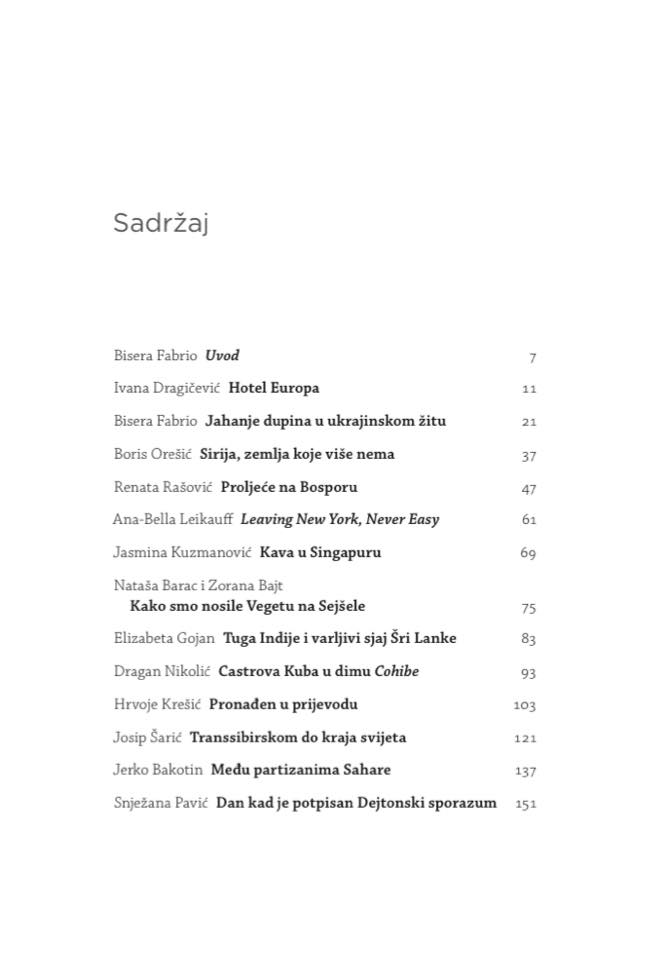Next week Croatian bookstores will populate their shelves with a unique literary edition, offering readers insight of the world from the perspective of domestic foreign affairs journalists. “Our Man in the Field” is a mighty collective of seasoned journalists from both the printed and electronic media, gathered to share what they never did – how they feel when the cameras are off, what we can learn of Yugoslavia from Polisario soldiers, why it’s important to have Vegeta in the Seychelles, what memory residue they carry from Lampedusa, Ukraine, Syria…
The collection of reportages “After the Deadline – Stories from the Field” was written by 14 current and former foreign affairs journalists, including Bisera Fabrio, recent top journalist in Globus weekly, today an advisor at the Croatian embassy in Beijing, who edited the book. It took a year to prepare, with a key role in its creation played by Ivana Dragičević, foreign affairs editor on N1 television, where she transferred after nearly two decades at Croatian Radio Television.
“The first hand experiences are a great benefit to all of us gathered around this book. This could be a good step towards more relevant, important domestic books, as articles, or radio and television minutes, are often not enough, as well as editorial policies that often don’t allow for a story to be complete,” said Dragičević for Tportal.hr on September 7, 2016.
The book will be available from September 13, compiling the works and stories of Boris Orešić, Renata Rašović, Ana-Bella Leikauff, Jasmina Kuzmanović, Nataša Barac and Zorana Bajt, Elizabeta Gojan, Dragan Nikolić, Hrvoje Krešić, Josip Šarić, Jerko Bakotin and Snježana Pavić.
Ivana Dragičević recalls that journalists are often in different surroundings, from presidential salons to mud and blood in wars of different cultures and customs.
“A reporter must be adaptable and open, informed to understand the context, know how to talk with everyone – from peasants on the west coast of Palestine to Bashar al-Assad. Politics and the media often fail in informing the public on many important issues, which is why I think we don’t have an informed electorate,“ said Dragičević.
Her belief is that citizens want serious content in media. “No one can convince me that people just want triviality and want to hear just from Plenković or Petrov. I think they want to know what is going on, they want relevant content,” she pointed out.
She reminds that the three key people in Croatia – the president and leaders of the two major parties – built their careers in foreign affairs. “Journalists are always on the other side of the barricade, but these people know something on foreign affairs and it pains my heart to watch a TV debate without any questions on foreign affairs, ignoring refugees, large political turmoil in the neighbourhood, the war in Syria around the corner.”

Table of contents
Bisera Fabrio Introduction
Ivana Dragičević Hotel Europa
Bisera Fabrio Riding dolphins in Ukranian wheat
Boris Orešić Syria, country no more
Renata Rašović Spring in the Bosporus
Ana-Bella Leikauff Leaving New York, never easy
Jasmina Kuzmanović Coffee in Singapore
Nataša Barac and Zorana Bajt How we took Vegeta to the Seychelles
Elizabeta Gojan The sorrow of India and deceptive shine of Sri Lanka
Dragan Nikolić Castro’s Cuba through the smoke of a Cohiba
Hrvoje Krešić Found in translation
Josip Šarić Trans-Siberia to the end of the world
Jerko Bakotin Among the partisans of the Sahara
Snježana Pavić The day when the Dayton Treaty was signed










